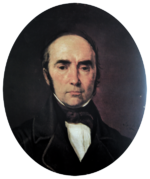About Simonas Daukantas
- Simonas Daukantas (Polish: Szymon Dowkont; 28 October 1793 – 6 December 1864) was a Lithuanian/Samogitian historian, writer, and ethnographer.
- One of the pioneers of the Lithuanian National Revival, he is credited as the author of the first book on the history of Lithuania written in the Lithuanian language.
- Only a few of his works were published during his lifetime and he died in obscurity.
- However, his works were rediscovered during the later stages of the National Revival.
- His views reflected the three major trends of the 19th century: romanticism, nationalism, and liberalism.Daukantas was born in Samogitia to a Lithuanian family.
- Likely a son of free peasants, he later produced proof of his noble birth to get university degree and a promotion in his government job.
- He attended schools in Kretinga and Žemaiciu Kalvarija and was noted as an excellent student.
- Daukantas studied law at the University of Vilnius, though his interest lay in philology and history.
- After the graduation, he worked as a civil servant of the Russian Empire from 1825 to 1850.
- He first worked at the office of the Governor-General of Livonia, Estonia and Courland in Riga then moved to Saint Petersburg to work at the Governing Senate.
- At the Senate, he had the opportunity to study the Lithuanian Metrica, the state archive of the 14–18th century legal documents of the Grand Duchy of Lithuania.
- In 1850, Daukantas retired from his job due to poor health and moved back to Samogitia where he lived in Varniai under the care of bishop Motiejus Valancius for a few years.
- He hoped to publish some of his works with bishop's help, but the bishop prioritized religious work and they began to quarrel.
- In 1855, Daukantas moved to Jaunsvirlauka in present-day Latvia and later to Papile where he died in obscurity in 1864. While Daukantas knew seven languages, he published exclusively in Lithuanian.
- He was a prolific writer and worked on a wide range of books – studies on the history of Lithuania, publications of primary historical sources, collections of Lithuanian folklore, Polish–Lithuanian dictionaries, Latin textbook for schoolchildren, primer of the Lithuanian language, Catholic prayer book, agricultural manuals for peasants, translations of classical Roman texts, novel for youth inspired by Robinson Crusoe.
- However, only a few of these works were published during his lifetime.
- Of the four studies on history, he managed to publish only one, The Character of the Ancient Lithuanians, Highlanders, and Samogitians, in 1845.
- While he was a well read erudite who spent considerable time and effort in obtaining primary sources, his historical works are highly influenced by romantic nationalism and didactically idealize the past.
- He used poetic descriptions, rhetorical elements, and emotional language that brought his history works closer to a literary work.
- His histories are valued not for their scientific content, but for their contribution to the development of the Lithuanian national identity.
- After the closing of Vilnius University in 1832, Lithuanians did not have a professionally trained historian until 1904 and used Daukantas' histories extensively.
- Daukantas identified language as the determining factor of nationality and articulated the nationalist anti-Polish sentiment that became the fundamental ideas of the Lithuanian National Revival and that survive in Lithuanian historiography into the 21st century.
Read more at Wikipedia
See Also
- Famous People's Birthdays on 17 October, Lithuania
- Famous People's Birthdays in October, Lithuania
- Famous writer's Birthdays on 17 October, Lithuania
- Famous writer's Birthdays in October, Lithuania
- Famous historian's Birthdays on 17 October, Lithuania
- Famous historian's Birthdays in October, Lithuania
- Famous author's Birthdays on 17 October, Lithuania
- Famous author's Birthdays in October, Lithuania
- Famous lexicographer's Birthdays on 17 October, Lithuania
- Famous lexicographer's Birthdays in October, Lithuania


 Date of Birth:
Date of Birth: 